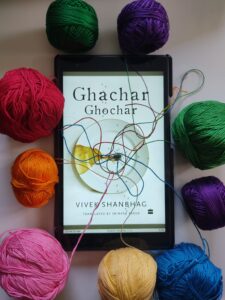
Book Name: Ghachar Ghochar
Author: Vivek Shanbhag
Publishing House: Harper Perennial
Page: 128
Price: Click the link
Introduction:
It’s a wonderful journey to read Vivek Shanbhag’s debut novel, Ghachar Ghochar (2015). Written in Kannada, this novel is translated into English by Srinath Perur. Set in the busy city of Bangalore, India, Ghachar Ghochor, is a perfect jigsaw of fact, fiction, and experience. Vivek Shanbhag has masterfully explored the human psyche caught in the spider web of society.
“…it’s not we who control the money,” says the narrator, “ it’s the money that controls us.” It is a gripping story where the author through the voice of the narrator sketches the moral degradation of a family with the financial uprising.
Characters and Themes:
The characters are smartly cobbled together in perfect harmony with the social dichotomy of money-oriented life.
-
The waiter of the coffee House, Vincent, like a moral, ‘the Everyman’ character of medieval literature kept commenting on the incidents and happenings that bore some deeper meaning underneath.
-
Chitra, a feminist who worked for a woman welfare organization was the narrator’s, first love. But he married Anita. Maybe Chitra’s independence, more concern for philanthropic works, feministic outlook, interrogative mind made her inappropriate as a suitable bride. Anyway,
-
Anita, his wife was more independent in her attitude and more outspoken to any incidents that did not suit her.
-
“ Anita was not the meek, obedient sort. She would say what she felt without holding back. She could go to great lengths for her ideals. In this regard, she may even have been more fierce than Chitra.”
-
She is the witty and straightforward lady who was the protest figure. She could not keep her tongue withdrawn from criticizing the wrongs.
-
Chikkappa was their uncle The poor family after the loss of job of the father figure, depends on Chikkappa. He ran an illegal business underneath the spice business and maintained the power along with the antisocial and ‘gundas’. Therefore, gradually their economic condition flourished making them crazy in their behaviours and selfishness.
-
The narrator’s mother defended the comfort and security of the family by not allowing Chikkappa to get anywhere and live his own life.
-
The sister Malati started thinking of herself as the queen of the world and behaved with extreme arrogance. She even left her husband’s house.
-
The narrator, like a detached observer, telescoped the lives and thoughts of the characters and led us to the mayhem of psychological conflict.
-
The characters like the boss of Appa’s office with his flawed pronunciation of “an important matter” to ” unimportant matter”, Malati’s mother-in-law’s limping steps due to arthritis had very little role to play but the minute details of their little roles made them so important and vivid. It proved the efficiency of the writer in character portrayal.
The Title:
The title of the novel is unique. The name Ghachar Ghochar has nothing to do with any literary significance. It is a made-up phrase invented and used by Anita’s brother. He used this word to suggest things that were messy and tangled. Once she and his brother were rolling kite string when he got impatient with the messy string and flung it down. He termed it as ‘ghachar ghochar’. From then on, the term was included in that family.
The Ants:
Ant was a significant figure in this novella. Even with their tiny tots, they hurried here and there making the lives of the narrator’s family members miserable.
Their promiscuous existence disrupted the normalcy of the narrator’s mother who along with the fumes of neem leaves used to take a consistent vigilance even at midnight on their track.
They seized a single grain of rice, or crumps of snack, they gathered around the rings under teacups on the floor. Ant came even at the latter half of the novel when the narrator along with his wife visited Ooty for their honeymoon. In the hotel room, the narrator casually poked an ant with his finger. It shocked his wife who loathed “ the senseless violence humans indulged in.”
The Ending:
The ending of the novel is as startling and suggestive as the beginning of the novel. The most fascinating feature of this novel is the connotative thread of implication, where the readers are left halfway to contemplate and fill the remains on their own. Both the ending and the opening is at the coffee shop under the close speculation of Vincent, the prophet figure.
“ Blood is thicker than water, isn’t it, sir?”
The narrator began to shiver at the mention of blood and felt concerned for his wife who had gone to her father and did not call him. His family members might have conspired to kill Anita as she was against the scrupulous business of his uncle.
“ Sir, you want to wash your hand. There’s blood on it.”
It alludes to the hands of Lady Macbeth or Macbeth. After the murder of Duncan Macbeth’s hands were bloody. And Lady Macbeth got obsessed with the blood in her life
So when Vincent, the waiter suggested him to wash his bloody hands he froze. He was well aware of the moral conflict of his wife with his family.
“ I feared right then that her presence at home would be the cause of much turmoil.”
“ I freeze. What is happening? What have I become entangled in? There must be some way out of all this…The words rush into my head of their own accord: ghachar ghochar.”
Alvina’s Verdict:
There is no show of unnecessary vocabulary muscle, high flown up language. The story, the plot match with us, the common people. We can identify ourselves with the psychological tug of war of the characters. Apart from this simplicity, there is a philosophy at every layer of the novel as it unravels itself through the progressive plot and multiple characters. Above all, I like the tart truths of human minds as competently dug up by the writer. Man is controlled by money and power and can fight ferociously with all animosity to keep up their position in the family as well as in society at any cost.






